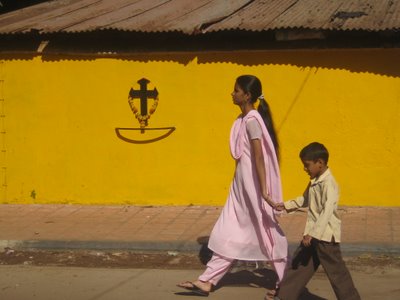 Although Jesus was not born on Christmas, and probably not even in the wintertime, Goa, along with the rest of the Christian world, celebrates his birthday on December 25th. It may seem a little late for a Christma post, but in Goa Christmas celebrations continue until the end of winter break in the begining of January. In the USA christmas time starts in the begining of December and ends shortly after Dec 25, but here, Christmas celebrations start a few days before Dec 25. Many Xmas parties are after Dec 25th in Goa.Christmas is a very festive time in Goa that brings many special dishes to the table. Sans rival is a Goan cake that makes many appearances during the holiday season. It is a cashew cake with sugar icing.
Although Jesus was not born on Christmas, and probably not even in the wintertime, Goa, along with the rest of the Christian world, celebrates his birthday on December 25th. It may seem a little late for a Christma post, but in Goa Christmas celebrations continue until the end of winter break in the begining of January. In the USA christmas time starts in the begining of December and ends shortly after Dec 25, but here, Christmas celebrations start a few days before Dec 25. Many Xmas parties are after Dec 25th in Goa.Christmas is a very festive time in Goa that brings many special dishes to the table. Sans rival is a Goan cake that makes many appearances during the holiday season. It is a cashew cake with sugar icing.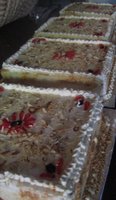 The baker, Raju, at Nostalgia in south Goa baked about 20 sans rival cakes in two days, and each cake has about five layers. Bebinca is another layer cake that takes about 6 hours to cook. Talk about slow food. The coconut batter is baked one layer at a time with a little ghee between each layer until there are 8 to 12 layers. the resulting cake becomes a dark translucent color with layers that peel apart.
The baker, Raju, at Nostalgia in south Goa baked about 20 sans rival cakes in two days, and each cake has about five layers. Bebinca is another layer cake that takes about 6 hours to cook. Talk about slow food. The coconut batter is baked one layer at a time with a little ghee between each layer until there are 8 to 12 layers. the resulting cake becomes a dark translucent color with layers that peel apart. 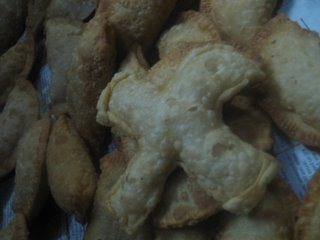
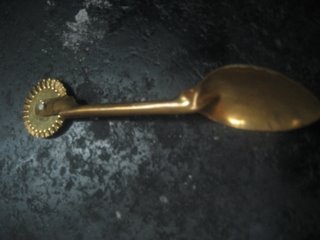 Everyone has there own way of eating bebinca. Another festive Goan classic that Chef Fernando and his team creates for the Christmas season is Dedos De Dama, cashew frangipane coated in sugar caramel. For the Goan parties last week we cut a watermellon in half and stick the dedos de dama (maiden's fingers) onto decorated skewers, which are then dipped into hot caramel (like making crouquembouche) then the skewers are stuck into the watermellon, making a funky spiked dome. Guests pull a stick from the watermellon and enjoy the dedos de dama like lolypops.I also enjoyed making Neuros with the hardcore Goan chefs at Nostalgia. Neuros are addictive sweets that are made for Christmas in Goa. They are fried pastries like empanadas that are filled with semolina and coconut. The first Neuro is shaped into a cross to bless the rest of the batch which are shaped like half moons using a special spoon that has a fluted pastry wheel at one end and a spoon for the filling on the other end. I found some of these spoons in Mapsa for 15 rupees each.
Everyone has there own way of eating bebinca. Another festive Goan classic that Chef Fernando and his team creates for the Christmas season is Dedos De Dama, cashew frangipane coated in sugar caramel. For the Goan parties last week we cut a watermellon in half and stick the dedos de dama (maiden's fingers) onto decorated skewers, which are then dipped into hot caramel (like making crouquembouche) then the skewers are stuck into the watermellon, making a funky spiked dome. Guests pull a stick from the watermellon and enjoy the dedos de dama like lolypops.I also enjoyed making Neuros with the hardcore Goan chefs at Nostalgia. Neuros are addictive sweets that are made for Christmas in Goa. They are fried pastries like empanadas that are filled with semolina and coconut. The first Neuro is shaped into a cross to bless the rest of the batch which are shaped like half moons using a special spoon that has a fluted pastry wheel at one end and a spoon for the filling on the other end. I found some of these spoons in Mapsa for 15 rupees each.
Tune: Spoon by Cut Chemist
Tune: Spoonful Blues by Charley Patton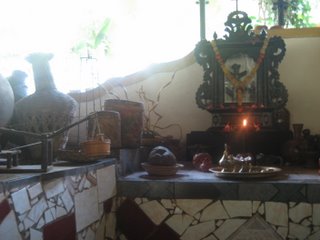 Vasco de Gama arrived in Goa in 1498 to set up a Portuguese colony to control the spice trade since the land routes were cut off by the Ottoman Dynasty. Half a century later the Christian Missionary, St. Francis Xavier, tried to start an inquisition in Goa. The Goan Inquisition started about a decade after his death. His body (most of it) is in a glass couffin in Old Goa at the Basilica of Bom Jésus. It has resisted decay and they say that his fingernails continue to grow. Every ten years his body is displayed to the public and people make a pilgramige to see his corpse.
Vasco de Gama arrived in Goa in 1498 to set up a Portuguese colony to control the spice trade since the land routes were cut off by the Ottoman Dynasty. Half a century later the Christian Missionary, St. Francis Xavier, tried to start an inquisition in Goa. The Goan Inquisition started about a decade after his death. His body (most of it) is in a glass couffin in Old Goa at the Basilica of Bom Jésus. It has resisted decay and they say that his fingernails continue to grow. Every ten years his body is displayed to the public and people make a pilgramige to see his corpse.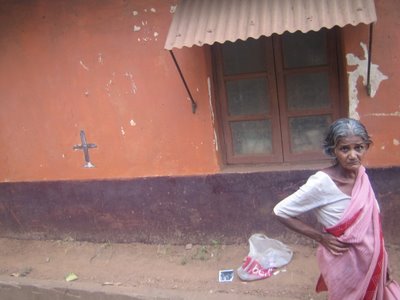 One year a lady from bombay bit off a piece of his fingernail and brought it back to Bombay with her, but when her family found out they made her return it. St Francis Xavier's right arm was sent to the main Jesuit church in Rome where it is on display. His right hand was the hand he used to bless and baptize his converts.
One year a lady from bombay bit off a piece of his fingernail and brought it back to Bombay with her, but when her family found out they made her return it. St Francis Xavier's right arm was sent to the main Jesuit church in Rome where it is on display. His right hand was the hand he used to bless and baptize his converts.
Tune: I Had Me Hands In Me Pocket at the Time by George Formby Senior who was born one hundred years before I was. He colapsed durring the run of a Christmas performance which led to his death a few months later.
Tune: Hands of Fate by Lakim Shabazz
Many Jews who fled the Iberian Inquisition landed in Goa. The Hindu rulers of Kerala helped many Jews escape the Goan Inquisition by allowing them to move to Cochin. They were soon chased out by the Goan Inquisition. By the end of the 16th century, many Hindu Goans had converted to Christianity. It became illegal for Hindus to practice in public, and most temples were destroyed. The Portuguse built churches all over Goa. They outlawed many soulcocina staples, like Hindu instruments, food, and paan. 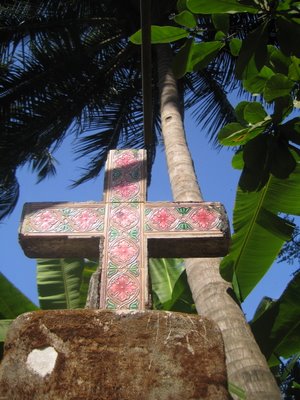
My computer is down, so my gospel and Jesus tribute mixes are not available. (anyone with the mixes can email them to me please). So for now, I offer some great tunes about Jesus that I have collected from some of my favorite audioblogs like Moistworks and Wayne and Wax.
Tune: Jesus Gave Me Water by The Five Blind Boys of Mississippi
Tune: Me and Jesus the Pimp in a "79 Granada Last Night by The Coup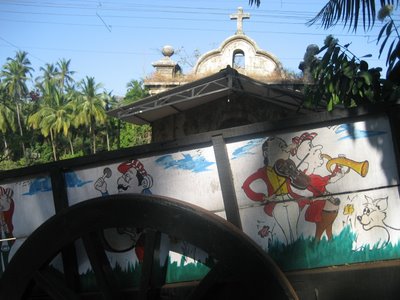
Tune: I Heard The News (Jesus is Coming Again) by Sister Wynona Carr
Tune: Sexy Jesus by Wayne & Wax
Under the Inquisition, Hindu names were also banned. People would take the name of the priest who christianed or baptised them.
Tune: Baptise Me in Wine by Screamin' Jay Hawkins
The Missionaries did allow the recently converted Goans to keep the tradition of the caste system, which convieniently helped to keep control of the people. In 1623 the Pope, Gregory XV passed a decree that allowed all converted Hindus to keep the caste system.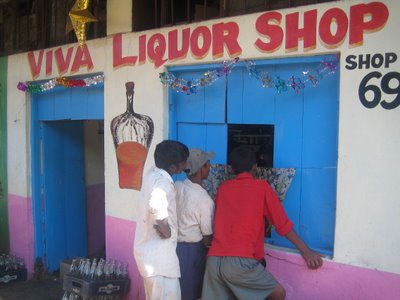 Another aspect of Portuguese culture that has survived in Goa is the love of booze. These kids (above) are lined up outside the Viva Liquor Shop in Panjim on Christmas day.
Another aspect of Portuguese culture that has survived in Goa is the love of booze. These kids (above) are lined up outside the Viva Liquor Shop in Panjim on Christmas day.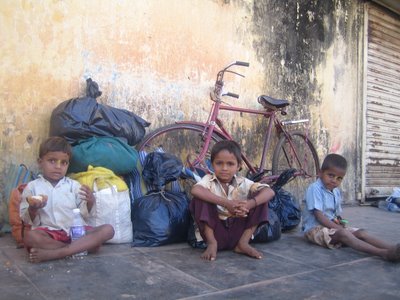 Another part of Portuguese culture that lives on in Goa is the Siesta. These kids decided to stay awake during siesta time near the Panjim market on Christmas day while some of the ladies that sell vegetables at the market decided to take a cat nap.
Another part of Portuguese culture that lives on in Goa is the Siesta. These kids decided to stay awake during siesta time near the Panjim market on Christmas day while some of the ladies that sell vegetables at the market decided to take a cat nap.





There were some Hindu Brahmins that resisted the Portuguese rule that occupied the islands of Divar and Chorao, the two largest islands on the Mandovi River. They gaurded the islands against Portuguese invasion and even raided some of the Portuguese garrisons along the river. The Indo-Portuguese monk, Fr. José Custódio de Faria, (AKA Abbé Faria) was one of the leaders of a revolt against Portuguese rule in Goa in the Conspiracy Of The Pintos in 1787. Abbé Faria was one of the pioneers of the scientific study of hypnotism.
Tune: The Hypnotic by The Roots
I can't share the recipe for Chef Fernandos nueros, which are filled with roasted semolina and coconut and fragrant with cardamon. But I will share another popular versian of the Christmass Nuero. The dough for the outer crust is made from boiled sweet potatoes. This recipe comes from a book of Goan Saraswat Hindu recipes called Ishtann that I picked up in Goa.
Sweet Potato Nueros
4-5 sweet potatoes, boiled then cooled to room temp
1 1/4 cup grated coconut
3/4 cup Goan jaggery (jaggery from coconut palm)
8-10 cashewnuts, crushed
a pinch of cardamom powder
salt to taste
ghee
Put potatoes in a stock pot, cover with enough water and cook until done (they should be mushy to the touch). Drain and let cool.
Mix grated coconut, cashew pieces, salt and cardamom powder. Add jaggery and cook on moderate heat until the mixture is thoroughly combined. Keep aside.
Peel the potatoes, mash them and form a dough. Flatten into circles with your fingers. Spoon a little filling on one side and fold over into a crescent. Make ridges with a fork, press lightly and keep aside.
Heat a griddle on moderate heat. Fry the nuero using ghee until GBD. Turn over gently and fry on the other side.
Drizzle with ghee and serve hot.
Monday, December 25, 2006
Christmas in Goa
Subscribe to:
Post Comments (Atom)






1 comment:
ed hardy clothes
discount nike running shoes
discount nike shoes
nike shox shoes
ed hardy outerwear
ed hardy womens
ed hardy womens jeans
cheap nike shoes
nike sports shoes
puma running shoes
puma sneakers
ed hardy bags
ed hardy winter boots
ed hardy t shirts
nike shoes kids
nike women shoes
nike running shoes
ed hardy womens shoes
ed hardy t shirts for men
ed hardy mens jeans
wholesale nike shoes
nike shoes
nike tn dollar
nike air max 90
nike air max 2009
nike air max 2010
nike air max tn
puma cat
ed hardy mens shoes
ed hardy womens hoodies
ed hardy mens tees
puma shoes
ed hardy clothing us
ed hardy clothing
ed hardy men’s
ed hardy women’s
cheap ed hardy
ed hardy wholesale
ed hardy clothes
ed hardy shirts
Post a Comment